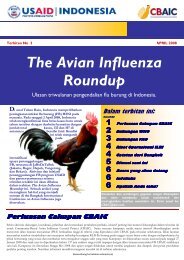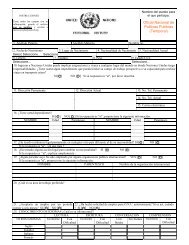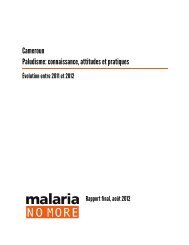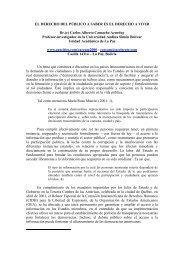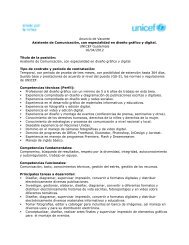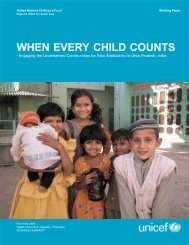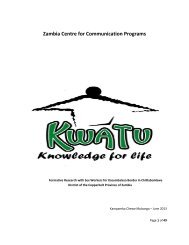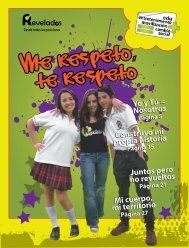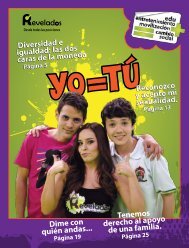to download the 38-page evaluation - The Communication Initiative ...
to download the 38-page evaluation - The Communication Initiative ...
to download the 38-page evaluation - The Communication Initiative ...
You also want an ePaper? Increase the reach of your titles
YUMPU automatically turns print PDFs into web optimized ePapers that Google loves.
From Radio Communitaire de Dollé: ―Episodes # 21, 22, 23, 24: re-broadcast two times<br />
each because of listener phone calls. Next <strong>to</strong> Episode # 24, on charity and religion, this<br />
comment appears: ‗Our Marabouts have greatly appreciated this <strong>to</strong>pic‘.‖<br />
Radio Mangari in Maïné Soroa, like Radio Dollé listed above, also re-broadcast episodes 21–24 two<br />
extra times each. After <strong>the</strong> notation of ―2 re-broadcasts,‖ Radio Mangari staff added this comment:<br />
―Listeners would like <strong>the</strong> program <strong>to</strong> also be produced in Kanuri and Peul‖ (two additional languages<br />
spoken in <strong>the</strong> east (Kanuri) and throughout Niger (Peul)). This final comment builds on an earlier<br />
remark made by <strong>the</strong> religious leader Oustaze Mouha, about his belief that PDEV programs should be<br />
expanded <strong>to</strong> cover a wider geographic area. In this case, <strong>the</strong> suggested expansion involves language<br />
ra<strong>the</strong>r than terri<strong>to</strong>ry. In ei<strong>the</strong>r case, <strong>the</strong> request for broader and more linguistically diverse PDEV<br />
programming can be interpreted as a vote of confidence by <strong>the</strong> listeners and stations expressing <strong>the</strong>se<br />
views.<br />
Beyond a reflection of <strong>the</strong> programs popularity, asking for Sada Zumuntchi <strong>to</strong> be broadcast in<br />
new areas and in additional languages is a request <strong>to</strong> make <strong>the</strong> program even more democratic, more<br />
accessible. To meet this demand in follow-on programming, one might consider a targeted and wellsupervised<br />
expansion of <strong>the</strong> local production component of <strong>the</strong> PDEV media project (see p. 29 for more<br />
on this activity). Collaborating with local production partners <strong>to</strong> increase <strong>the</strong> linguistic and geographic<br />
reach of <strong>the</strong> programs serves a two-fold purpose: it increases <strong>the</strong> capacity of partner radio stations<br />
while increasing <strong>the</strong> number of people who can access—and ideally discuss—program content. An<br />
additional benefit of working with local partners is that <strong>the</strong>y create content that is appropriate and<br />
relevant for <strong>the</strong> local context. Supervision and quality control by PDEV staff (or PDEV follow-on project<br />
staff) ensures that peace and <strong>to</strong>lerance-related content is accurately and systematically included.<br />
Supervision of partner collaborations also allows project staff <strong>to</strong> identify areas where partners might<br />
benefit from fur<strong>the</strong>r training and <strong>the</strong>n plan/implement accordingly.<br />
My discussions with partner radio stations suggest that current structure of having a PDEV staff<br />
member serving as point person for <strong>the</strong> partnerships seems <strong>to</strong> be working. <strong>The</strong> ongoing need that<br />
partner radio stations identified was additional training, both in new areas and <strong>to</strong> reinforce what <strong>the</strong>y<br />
have already learned. <strong>The</strong> implication for PDEV project staff (or PDEV follow-on project staff) is that<br />
<strong>the</strong>ir numbers may need <strong>to</strong> be reinforced <strong>to</strong> meet <strong>the</strong> needs of partner stations, especially if <strong>the</strong>y are<br />
producing <strong>the</strong>ir own programs. A dedicated training specialist who could work exclusively on<br />
professional development for partner stations would be particularly useful in my view.<br />
<strong>The</strong> production and reception of Chabab Wal Din<br />
In Chad, <strong>the</strong> youth-oriented radio show Chabab Wal Din is written and presented by Abbas and<br />
Abdelaziz, two young producers from Al-Quoran and Al Bayan, long-established radio stations with a<br />
strong Islamic orientation. <strong>The</strong> producers collaborate with a PDEV senior producer and are overseen<br />
and advised by <strong>the</strong> Content Advisory Group (CAG) that includes PDEV/Chad Media Direc<strong>to</strong>r Zara<br />
Yacoub—<strong>the</strong> only female CAG member. <strong>The</strong> initial partnership between <strong>the</strong> PDEV media team and <strong>the</strong><br />
two partner stations was shaky at first. When <strong>the</strong> role of Al Quoran and Al Bayan was limited <strong>to</strong> that of<br />
broadcast partners, <strong>the</strong>y had each expressed doubts, and in <strong>the</strong> case of Al Bayan rejection, of PDEV<br />
program content. Youfedi Abdulaziz Hassan, program direc<strong>to</strong>r of Radio Al Bayan, explained <strong>the</strong>ir<br />
position in this way:<br />
<strong>The</strong>re were some elements in <strong>the</strong> youth program [Chabab al Haye] that were not in line<br />
with our culture. A person should not refer <strong>to</strong> a woman who is not his wife as ―my<br />
21



